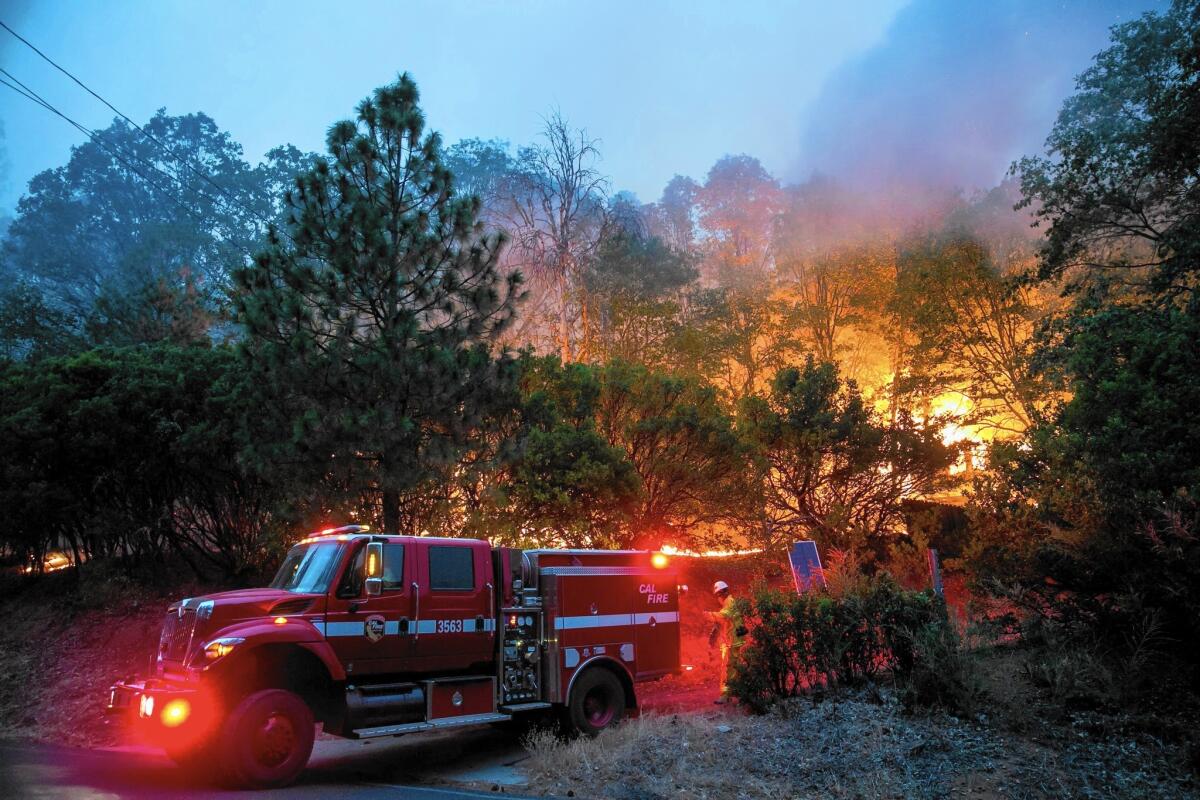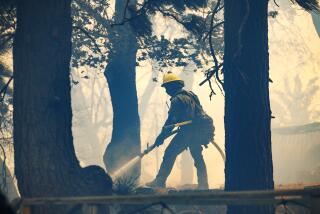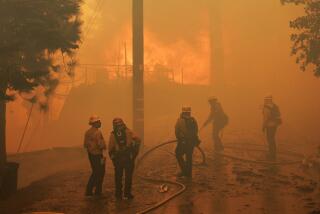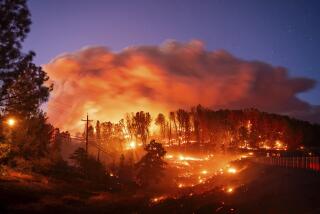Rural radio station offers a calming voice amid Valley fire confusion

One caller to radio station KPFZ-FM in Lakeport, Calif., said, “You’re the glue that holds the county together.” Above, firefighters leave an area in Seigler Springs where the Valley fire destroyed a home.
LAKEPORT, Calif. — Part group therapy and part public service announcement, homespun coverage by KPFZ-FM (88.1) of the wildfire that rampaged through Northern California’s rural Lake County last week has emerged as one of the few unifying, uplifting forces for people separated by road closures and mandatory evacuation orders.
“We’re like the neural network for the body of Lake County,” said Nils Palsson, 30, a community organizer who raced to the studio early Saturday evening after flames drove him from his Loch Lomond home.
The plan had been to broadcast the usual rock and reggae — maybe some Bob Marley and Deep Purple — out over the area’s chaparral-covered hills and low-lying mountains, throwing in some free legal advice.
Instead, Palsson and other volunteers began taking on-air calls from people wanting to know what was going on in what would, within days, become a 110-square-mile zone of fear and confusion.
A week later, the phone is still ringing.
Hour after hour, callers — sometimes fighting back panic — have asked for information about missing friends or offered beds, food and clothes for evacuees.
“Hippie Joe” had a ranch for homeless horses, complete with barn space and hay.
Audrey called to say her sister’s house wasn’t destroyed.
Randy asked whether anyone had seen his three donkeys, left behind on Cobb Mountain.
At night, as evacuees returned to shelters and friends’ homes, the topic turned from survival logistics to more intimate matters.
“This has been such an overwhelming week,” a caller named Cindy said late Tuesday night. She paused to clear her throat. “You guys have done a phenomenal job. You’re the glue that holds the county together.”
“Wow, that is so beautiful,” host Susan “Q” Novak said. “Peace and love.”
Founded in 1995 as a low-frequency pirate station, KPFZ cut its teeth fighting a proposed prison in Lake County. Since then, it has found legal spots on the FM dial and the Internet, along with a small but loyal audience in the towns along Clear Lake’s 100 miles of shoreline.
See the most-read stories this hour >>
The station typically divides its programming evenly between music and public affairs programs, including “I’m Not a Lawyer But I Play One on the Radio” and “Alternate Current” (subtitle: No Tea Party Allowed).
The hosts are politically plucky, relaying what goes on at Board of Supervisors meetings; sometimes accusing officials of failing to support the county’s poor, elderly and Native American residents.
In the studio, hosts broadcast under Mick Jagger’s watchful eye and a bumper sticker: “I’d Rather Be Smashing Imperialism.”
Local skeptics say the station’s cozy, cluttered studio on Main Street is a den of radicals and hippies.
“You could call me a communist, and you wouldn’t be wrong,” host Betsy Cawn, 71, said.
She laughed. “All I’ll say is, I’m pragmatic, and we talk a lot about human rights.”
But any small-town sniping was put on hold as walls of fire roared through one community after another, charring homes and cars and putting traditional means of communication out of commission.
Clear Lake’s size and the curving mountain roads that surround it can make neighboring towns feel distant, even if they’re only a few miles away. The lake, Palsson said, is “the thing that unites us all, and simultaneously, the thing that separates us.”
Victims of natural disasters often turn to Twitter and Facebook to get information and check in with loved ones. But many of Lake County’s poor and elderly residents don’t have Internet access, and evacuees fled without laptops or smartphones.
There is, though, one thing almost everyone has: a car radio.
It didn’t take elected officials and state safety workers long to realize that going on 88.1 FM was the best and perhaps only way to reach many Lake County residents.
A public information officer for the California Forestry and Fire Protection Department took to the air Tuesday to talk logistics, safety and threats.
Lake County Supervisor Jim Steele arrived at the station Wednesday with an armload of maps to help the on-air staff understand where the multiprong fire had been and where it might be going.
Many of the station’s volunteers weren’t accustomed to taking so many calls but cheerfully chatted their way through technical problems, as the lines went dead or crossed, leaving callers talking over each other.
“It’s real and honest and it’s intimate,” said station manager Andy Weiss, KPFZ’s sole paid employee. “There’s something about a voice that’s talking right to you.... I’m not sure the Internet has that warm and fuzzy part.”
As a gentle rain began to fall in Lakeport on Wednesday afternoon, Novak answered a call. “Hi!,” she said. “Welcome.”
“Hi,” the male caller said. “I’m having a real problem with addiction.”
Novak and Cawn exchanged a glance in the studio, preparing to offer a phone number for Alcoholics Anonymous.
The caller laughed: “I mean, I’m addicted to your show,” he said. “How do I stop listening?”
Twitter: @laura_nelson
Times staff writer Lee Romney contributed to this report.
ALSO:
California GOP softens its message on immigration in a bid for survival
The heat and the lines couldn’t keep them from the Broad on opening day
Gentrification foes worry that housing group is displacing Boyle Heights residents
More to Read
Sign up for Essential California
The most important California stories and recommendations in your inbox every morning.
You may occasionally receive promotional content from the Los Angeles Times.











